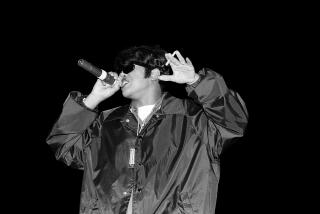JAZZ REVIEW : Ronnie Laws’ Sax Is Somewhat Muted at the Rhythm Cafe
- Share via
SANTA ANA — There just wasn’t enough of Ronnie Laws during his appearance Sunday at the Rhythm Cafe. His set, though certainly not long, was adequate in length--the saxophonist was on stage a bit less than an hour, playing both past glories and selections from his latest album, “Deep Soul.” But there was little that was deep and only a modicum of soul in Laws’ performance. For the most part, he was missing in action.
What action there was came from Laws’ beat-minded quartet of backup musicians, especially bassist Larry Antonino and guitarist Craig T. Cooper. Cooper’s chuck-a-luck rhythm style powered many of the up-tempo pieces, while his solos, played in tones that recalled George Benson’s jazz-based sound, were relaxed, rocking-chair affairs with plenty of swing. Bassist Antonino kept the proceedings pinned down with thumb-funk straight out of the Marcus Miller school as well as with crisp resonant tones played off the beat. With this kind of backing, you’d think Laws would take off.
But the saxophonist, who came out on tenor, stayed on the ground as he opened with his own “Big Daddy Swing” from the new album. He switched to soprano for Rob Mullins’ “Tonight’s the Night,” and though his spare improvisation contained some nicely bent tones and dynamic, sustained notes here and there, there was little to generate interest.
Still, there were moments when the real Ronnie Laws was visible, the one who created a fusion sensation in the late ‘70s with his suave, savvy style. When closing his 1978 hit “Friends and Strangers,” the saxophonist backed his soprano away from the microphone and, as the rest of the band sat out, he unleashed a series of emotional flurries balanced with considered, melodic lines.
He showed some tenor moves on another of his past successes, “Always There,” working himself into tight corners before waltzing out with sensibly lyrical lines. But after this brief, revealing glimpse, he took his bows and left the stage.
He came back for a perfunctory encore, a brief version of his “Every Generation” that he opened with a vocal in that quavering, crooners’ vibrato so many non-singers put to good use. Then after a short turn on soprano he was gone, this time for good.
The band, without Laws, opened with a funky version of Miles Davis’ “All Blues,” paced by strong backbeat from drummer William (Bubba) Bryant. Keyboardist Herman Jackson took the lead on the tune, getting a lush chiming sound from his synthesizer before guitarist Cooper strummed up a rhythmic storm in the same style he’d later use behind Laws.
Antonino, rather than sticking to the consistent, high-decibel attack favored by most electric bassists today, varied his dynamics and his sound quality, using clean, tender tones as well as table-shaking sounds maxed out on depth and volume.
Soprano saxophonist Jeff Gonzales’ opening set featured “Splatch,” a tune Marcus Miller wrote for Miles Davis’ “Tutu” recording, and similarly styled originals played with accessible simplicity. Pianist Tom McMoran added splash to Gonzales’ “Gray Ham” and bassist Kevin Brandon (recently seen with Aretha Franklin) used an aggressive, poppin’-fresh style that helped bring out the already out-front beats. Drummer Joey Heredia provided the muscle to keep these fusion anthems from folding.
For his part, Gonzales worked from an unthreatening pose, putting in enough rhythmic hooks, repeating phrases and long-held notes to keep the audience attentive. His ballad playing, as heard on “Everything Will Be All Right,” contained just enough sweetness without being sugary.
More to Read
The biggest entertainment stories
Get our big stories about Hollywood, film, television, music, arts, culture and more right in your inbox as soon as they publish.
You may occasionally receive promotional content from the Los Angeles Times.










